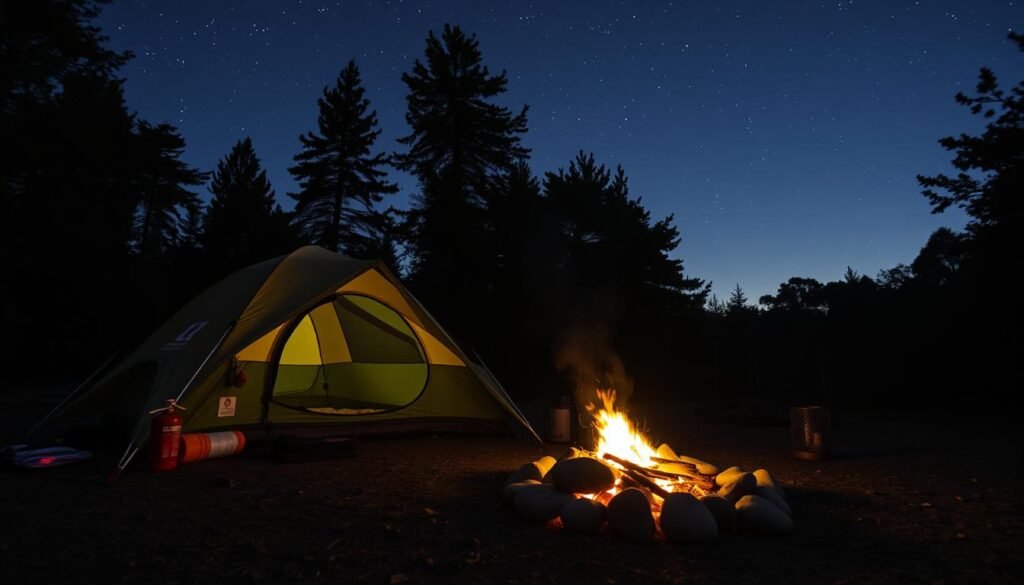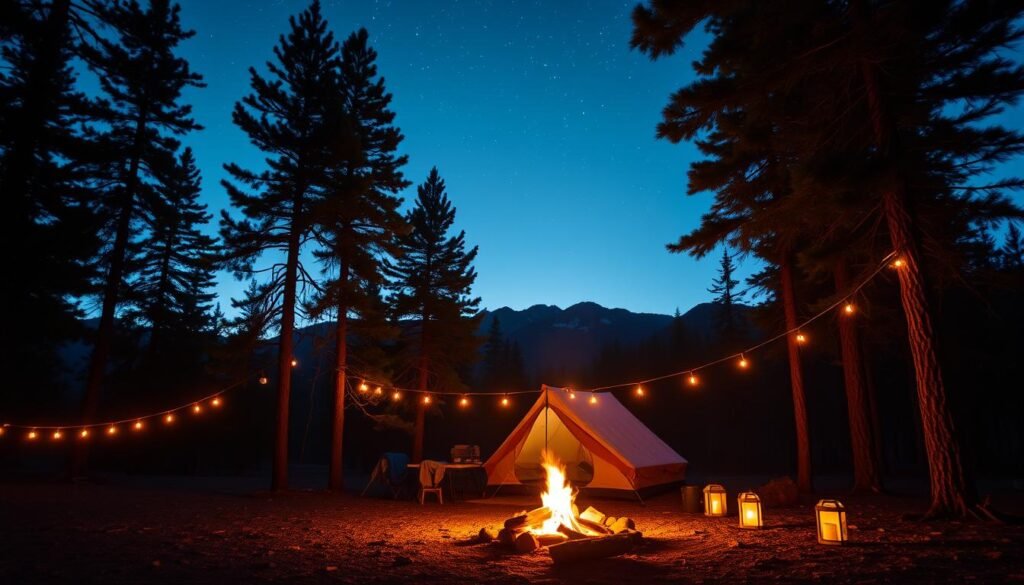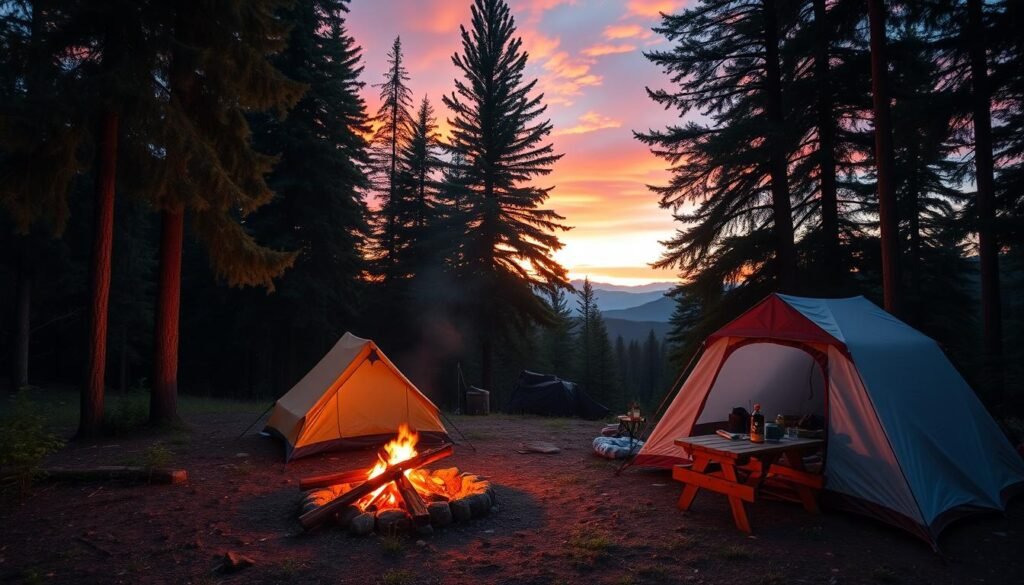
Going on outdoor adventures can be thrilling and a bit scary, especially for beginners. Whether you’re an experienced camper or new to it, making your trips safe and fun is key. In this article, we’ll share expert tips to help you enjoy the wilderness safely and have a great time.
Camping is becoming more popular, with 7.2 million first-time campers in 2022, according to The Dyrt’s 2023 Camping report. The beauty of nature and the excitement of outdoor activities are big draws. But, it’s important to be well-prepared and know the basics to have a great camping experience.
Types of Camping for Beginners
There are many camping options, each with its own pros and cons. Whether you’re new to camping or have been for years, knowing the different types can help you pick the right one for your next trip.
Tent Camping
Tent camping is the most common choice for beginners. It’s easy on the wallet and offers a range of tent sizes. But, it’s not great in cold or wet weather, and you might not have bathroom access. You’ll also need to book your spot early, especially at popular spots.
Glamping
Glamping, or “glamorous camping,” provides a more comfortable experience. You’ll find beds, linens, and even kitchens and bathrooms. It’s perfect for those who want to try camping but are a bit hesitant. Yet, it can be pricey, sometimes more than a hotel.
Car Camping
Car camping lets you bring your gear and set up at the campsite. It’s simple and doesn’t require a lot of planning. However, you might have to deal with noisy neighbors who also bring their cars.
Backcountry Camping
Backcountry camping takes you far from the crowds. It’s peaceful and offers a true nature experience. But, it’s for experienced campers only. You’ll need to plan well, have the right gear, and be ready for a hike to get there.
RV Camping
RV camping makes your trip easy with a bed, kitchen, and bathroom. It’s great for long trips. But, it’s the priciest option, with costs for renting or buying an RV and fuel. Plus, driving and parking a big RV can be a challenge.

Choosing the Right Campsite
Choosing the right campsite is key to a great camping trip. It doesn’t matter if you’re new or experienced. Knowing what to look for can make your camping safer and more fun.
Beginners should start at campsites with campground amenities like bathrooms and grills. Sites near the information center or office are safer and offer staff help. As you get more experience, you might want to try remote campsites. But remember to bring everything you need.

There are some basic rules for picking a campsite. Always camp at least 200 feet from trails and water to protect nature. In places like the Four Pass Loop Trail in Aspen, you need a special permit for certain sites. Always check the local rules before you go.
Look for a flat, solid spot like rock or sand for your tent. Avoid areas with soft plants to keep the environment safe. Also, watch out for dead trees or water paths to make sure your site is safe.
Pitching Your Tent Like a Pro
Finding the right spot for your tent is key for a good camping trip. Look for a flat area and avoid hazards like dead branches or big rocks. Clear the space of sticks, stones, and leaves to make it smooth.
Putting down a tarp first adds extra comfort and keeps water out if it rains.
Finding the Perfect Spot
When picking your tent site, choose a level ground to sleep comfortably. Check the area for any hazards that might get in the way. Clear the ground of anything that could block your tent.
Opt for a spot that’s a bit higher to stay dry in the rain.
Setting Up Your Tent
Get to know how to set up your tent by practicing at home before you go camping. This way, you can enjoy your trip more and not struggle with the tent. Start by laying down the tarp for a soft base.
Then, carefully put the poles in the right spots to avoid damage.
Make sure there’s enough room around your tent for guy lines and privacy. Pitching on a slight slope helps keep water out during heavy rain. With some prep and care, you’ll pitch your tent like a pro and have a great camping trip.
making camping trips safer and more enjoyable
To make sure your camping trips are safe and fun, being ready for emergencies is key. Carry a first aid kit, a flashlight, a pocket knife, a whistle, a compass, and a map. It’s also important to be careful with campfires. Follow the rules and keep them small to avoid fire prevention problems.
Keeping safe from bugs and wildlife is crucial. Use insect repellent, wear the right clothes, and keep your food safe to avoid bears or other animals. Always wear life jackets when swimming and check the weather to stay safe.
Never camp alone and always tell someone where you’re going in case of an emergency. By following these tips, you can enjoy your camping trips more while staying safe and respecting campground etiquette.
Camping Gear Essentials
For a great camping trip, the right gear is key. What you need changes based on the camping type, season, and trip length. But, there are some must-haves for every camper.
A good camping gear checklist includes sleeping essentials like a strong tent, sleeping bag, and pad. You’ll also need cookware like a portable stove, pots, pans, and utensils. Don’t forget water filters, lights, and safety items like bear spray or a waterproof dry bag.
It’s important to have clothes for different weather and sturdy shoes for hiking. A versatile tarp is also a must. It can be a ground cover, a rain shelter, or a wind screen. Quality camping gear makes your trip more comfortable and fun.
When making your camping gear checklist, choose wisely. Look for secondhand or budget-friendly camping equipment online or at thrift stores. This way, you save money without losing quality. Focus on gear that truly improves your camping experience and leave out the unnecessary.
What to Wear for Comfortable Camping
Packing the right clothes is key for a great camping trip. You’ll want camping clothing and layering for camping that keeps you comfy in any weather. Choose fabrics and styles that work well in different conditions.
Begin with a base layer of moisture-wicking fabrics like polyester or merino wool. These hiking attire absorb sweat and keep you dry. This is crucial for staying comfy during outdoor activities.
For the middle layer, pick insulating pieces like fleece or wool sweaters. They trap heat. And for the outer layer, a waterproof camping footwear jacket is essential to stay dry in rain.
Remember accessories too. A wide-brimmed hat protects from the sun, quick-drying socks are handy, and water shoes are great for swimming or wading. Layering and choosing the right fabrics ensures you’re comfy and ready for anything on your camping trip.
Camp Cooking Made Easy
Camping is exciting, and so is cooking outdoors. Many prefer no-cook or pre-made foods to avoid cooking hassle. This lets you enjoy your trip more, without the cooking stress.
No-Cook Meal Ideas
Great no-cook meals for camping food include overnight oats and bagels with cream cheese. Also, peanut butter and jelly sandwiches, pasta salads, and bean salads are good. Fresh fruit, veggies, hummus, and energy bars are also great choices.
Camp cooking is all about simplicity. Plan ahead with pre-made or no-cook meals. This way, you can enjoy your trip more, without the cooking mess.
Remember, camp cooking is about having fun. Choose what works for you and your group. Enjoy your time in nature, whether cooking or not.
Leave No Trace: Proper Campsite Cleanup
Keeping your campsite clean is key to protecting nature and making sure everyone has fun. By following Leave No Trace, you can reduce your impact and leave the campsite in great shape.
It’s important to dispose of trash properly to keep your campsite clean and safe. After meals, collect all trash and put it in strong, sealed bags if there’s no trash bin. Clean up as you go to keep your campsite neat. When you leave, make sure the fire is out and the area is as you found it.
Leave No Trace is more than rules; it’s a way to care for the outdoors. By following these principles, you protect the environment and make your camping better. So, clean up and leave your campsite better than you found it. This way, others can enjoy the outdoors for many years.